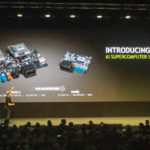“Watson and cognitive computing in general can serve significantly in every single arena in which we grapple with multi-layered, data-intensive problems: how to best treat cancers; how to adapt to conditions brought about by climate change; how to quickly and effectively harness new kinds of sustainable energy; how to untangle intractable governmental or community development challenges,” Frase stated. “Now more than ever, visionary thinking will drive an endless and transformative array of applications for Watson and cognitive computing in general, along with whatever comes next.”
Video: Nvidia Unveils ARM-Powered SoC with Volta GPU
Today at GTC Europe, Nvidia unveiled Xavier, an all-new SoC based on the company’s next-gen Volta GPU, which will be the processor in future self-driving cars. According to Huang, the ARM-based Xavier will feature unprecedented performance and energy efficiency, while supporting deep-learning features important to the automotive market. A single Xavier-based AI car supercomputer will be able to replace today’s fully configured DRIVE PX 2 with two Parker SoCs and two Pascal GPUs.
Raj Hazra Presents: Driving to Exascale
Raj Hazra presented this talk at ISC 2016. “As part of the company’s launch of the Intel Xeon Phi processor, Hazra describes how how cognitive computing and HPC are going to work together. “Intel will introduce and showcase a range of new technologies helping to fuel the path to deeper insight and HPC’s next frontier. Among this year’s new products is the Intel Xeon Phi processor. Intel’s first bootable host processor is specifically designed for highly parallel workloads. It is also the first to integrate both memory and fabric technologies. A bootable x86 CPU, the Intel Xeon Phi processor offers greater scalability and is capable of handling a wider variety of workloads and configurations than accelerator products.”






